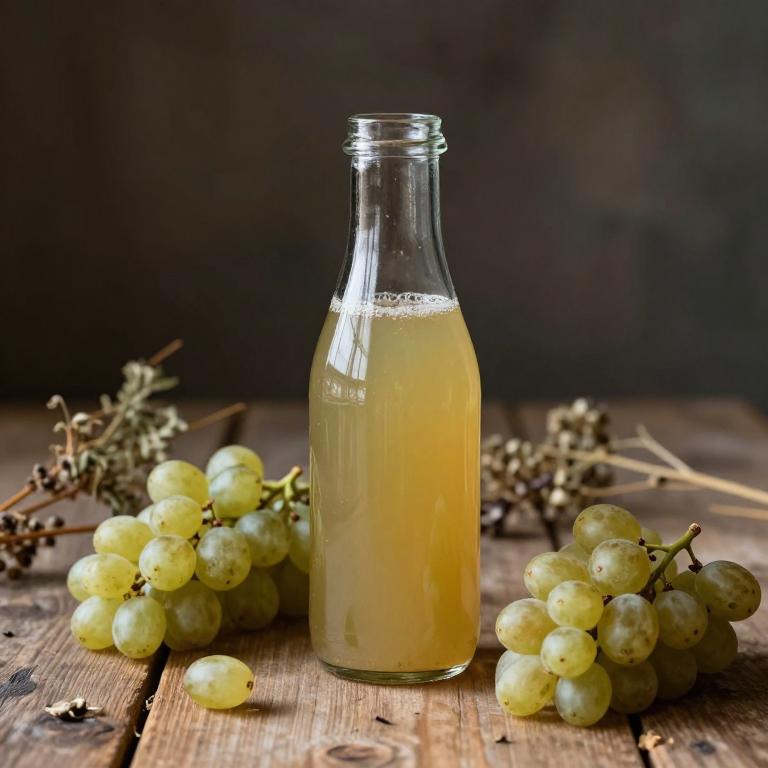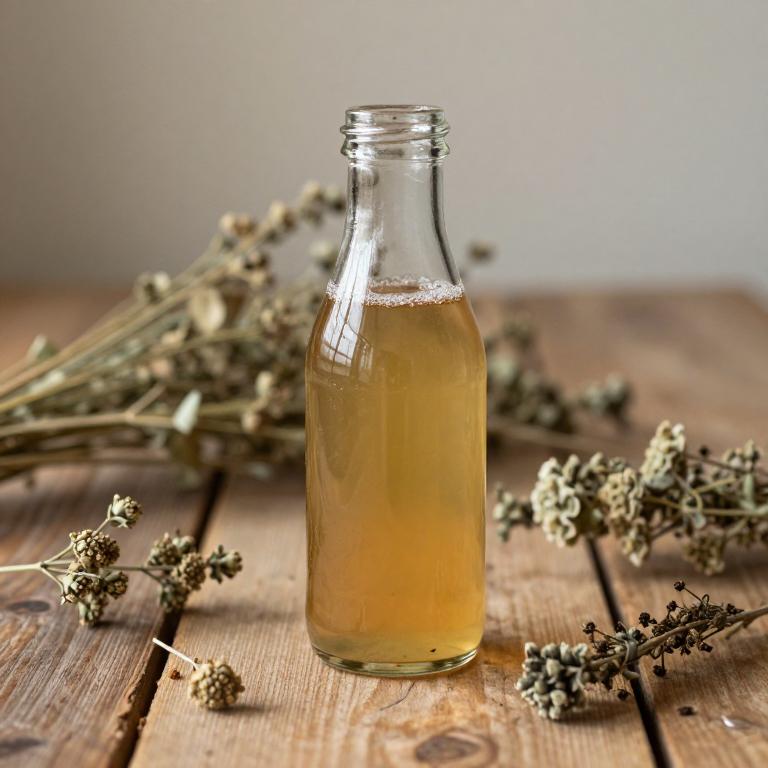10 Best Herbal Juices For Osteoarthritis

Herbal juices have gained popularity as a natural approach to managing osteoarthritis, offering potential anti-inflammatory and pain-relieving benefits.
Commonly used herbs include turmeric, ginger, and boswellia, which are known for their ability to reduce inflammation and support joint health. These juices are often consumed as part of a holistic wellness routine, complementing dietary changes and lifestyle adjustments. While they may provide relief for some individuals, it is important to consult with a healthcare professional before incorporating them into a treatment plan.
Overall, herbal juices can be a supportive element in the management of osteoarthritis, though they should not replace conventional medical treatments.
Table of Contents
- 1. Turmeric (Curcuma longa)
- 2. Ginger (Zingiber officinale)
- 3. Salvia (Salvia officinalis)
- 4. Common grape (Vitis vinifera)
- 5. Thistle (Silybum marianum)
- 6. Aloe vera (Aloe barbadensis)
- 7. Stinging nettle (Urtica dioica)
- 8. Dog rose (Rosa canina)
- 9. Licorice (Glycyrrhiza glabra)
- 10. Field horsetail (Equisetum arvense)
1. Turmeric (Curcuma longa)

Curcuma longa, commonly known as turmeric, contains curcumin, a bioactive compound with potent anti-inflammatory and antioxidant properties.
Studies suggest that curcumin may help reduce joint inflammation and pain associated with osteoarthritis by inhibiting inflammatory pathways in the body. Turmeric herbal juices, made from fresh or dried rhizomes, are a natural alternative to conventional treatments and are often used in traditional medicine for their therapeutic benefits. However, curcumin has low bioavailability, so combining turmeric with black pepper or consuming it with healthy fats can enhance absorption.
While some research supports its use for osteoarthritis, more clinical trials are needed to fully establish its efficacy and optimal dosage.
2. Ginger (Zingiber officinale)

Zingiber officinale, commonly known as ginger, has been widely used in traditional medicine for its potential anti-inflammatory and analgesic properties.
Herbal juices made from fresh or dried ginger root are often consumed to alleviate symptoms of osteoarthritis by reducing joint inflammation and pain. Studies suggest that the active compounds in ginger, such as gingerols and shogaols, may inhibit inflammatory pathways in the body. Regular consumption of ginger juice can support joint health and may serve as a complementary therapy alongside conventional treatments.
However, it is important to consult with a healthcare professional before using ginger juice as part of an osteoarthritis management plan.
3. Salvia (Salvia officinalis)

Salvia officinalis, commonly known as sage, has been traditionally used for its medicinal properties, including its potential benefits for osteoarthritis.
Recent studies suggest that sage contains compounds such as rosmarinic acid and flavonoids, which may help reduce inflammation and pain associated with the condition. Herbal juices made from fresh or dried sage leaves are believed to support joint health by improving circulation and reducing oxidative stress. Some individuals report relief from symptoms after incorporating sage-based herbal juices into their diet as part of a holistic approach to managing osteoarthritis.
However, more clinical research is needed to fully understand the efficacy and safety of sage herbal juices for this condition.
4. Common grape (Vitis vinifera)

Vitis vinifera, commonly known as the grape vine, has been traditionally used in herbal medicine for its potential health benefits, including its anti-inflammatory and antioxidant properties.
Herbal juices derived from Vitis vinifera, such as grape juice or extracts from its leaves and berries, may offer support for individuals with osteoarthritis by reducing inflammation and oxidative stress in joint tissues. These natural juices contain polyphenols, resveratrol, and other bioactive compounds that have shown promise in alleviating pain and improving joint function. While more clinical studies are needed to confirm their efficacy, some preliminary research suggests that regular consumption of Vitis vinifera-based herbal juices could be a complementary approach to managing osteoarthritis symptoms.
As with any herbal remedy, it is advisable to consult a healthcare professional before incorporating these juices into a treatment plan.
5. Thistle (Silybum marianum)

Silybum marianum, commonly known as milk thistle, is a herbal remedy that has gained attention for its potential benefits in managing osteoarthritis.
The active compound in milk thistle, silymarin, is believed to possess anti-inflammatory and antioxidant properties that may help reduce joint inflammation and oxidative stress associated with osteoarthritis. Some studies suggest that silymarin may support cartilage health and slow down the degradation of joint tissues, though more research is needed to confirm its efficacy. Herbal juices made from milk thistle are often consumed as a natural alternative or complement to conventional treatments.
However, individuals should consult with a healthcare professional before using milk thistle, as it may interact with certain medications or have side effects in some people.
6. Aloe vera (Aloe barbadensis)

Aloe barbadensis, commonly known as aloe vera, has been traditionally used for its soothing and anti-inflammatory properties, making it a popular herbal juice for managing symptoms of osteoarthritis.
The gel extracted from the aloe leaf contains a variety of bioactive compounds, including polysaccharides, enzymes, and antioxidants, which may help reduce joint inflammation and promote tissue repair. Some studies suggest that aloe vera juice could alleviate pain and improve mobility in individuals with osteoarthritis by modulating inflammatory responses in the body. While more clinical research is needed to confirm its efficacy, many users report positive effects when incorporating aloe vera juice into their dietary regimen.
As a natural remedy, aloe barbadensis juice is often used alongside conventional treatments to support overall joint health and reduce reliance on pharmaceuticals.
7. Stinging nettle (Urtica dioica)

Urtica dioica, commonly known as stinging nettle, has been traditionally used for its potential health benefits, including its role in supporting joint health.
Herbal juices made from fresh or dried stinging nettle leaves are believed to contain anti-inflammatory and antioxidant properties that may help alleviate symptoms of osteoarthritis. These juices are often prepared by juicing the leaves, which can be consumed daily as a natural remedy. Some studies suggest that compounds in stinging nettle, such as flavonoids and polyphenols, may reduce joint inflammation and pain.
While more research is needed, many individuals report improved mobility and reduced discomfort when incorporating stinging nettle juice into their wellness routine.
8. Dog rose (Rosa canina)

Rosa canina, commonly known as rosehip, has been traditionally used for its rich content of antioxidants, vitamins, and anti-inflammatory properties, making it a popular choice for herbal juices aimed at supporting joint health.
These juices are often recommended for individuals suffering from osteoarthritis due to their potential to reduce inflammation and alleviate joint pain. The high levels of vitamin C and polyphenols in rosehip contribute to the regeneration of cartilage and the reduction of oxidative stress, which are key factors in the progression of osteoarthritis. Studies suggest that regular consumption of rosehip-based herbal juices may help improve mobility and reduce the need for pharmaceutical interventions.
However, it is important to consult with a healthcare professional before incorporating these juices into a treatment plan, especially for those with existing health conditions or taking other medications.
9. Licorice (Glycyrrhiza glabra)

Glycyrrhiza glabra, commonly known as licorice, has been traditionally used in herbal medicine for its anti-inflammatory and analgesic properties.
The herbal juices derived from its roots contain compounds like glycyrrhizin and flavonoids, which may help reduce inflammation and pain associated with osteoarthritis. Some studies suggest that licorice extracts could inhibit the activity of enzymes involved in cartilage degradation, potentially slowing the progression of the disease. However, long-term use of licorice juice may lead to side effects such as hypertension and electrolyte imbalances due to its mineralocorticoid-like effects.
As a complementary therapy, glycyrrhiza glabra herbal juices may offer some relief for osteoarthritis symptoms, but they should be used under the guidance of a healthcare professional.
10. Field horsetail (Equisetum arvense)

Equisetum arvense, commonly known as field horsetail, has been traditionally used in herbal medicine for its potential health benefits, including its role in supporting joint health.
The plant is rich in silica, which is believed to help strengthen connective tissues and may reduce inflammation associated with osteoarthritis. Herbal juices made from equisetum arvense are often consumed to promote joint flexibility and alleviate pain in affected areas. However, it is important to note that while some studies suggest possible benefits, more clinical research is needed to confirm its efficacy and safety for osteoarthritis treatment.
As with any herbal remedy, it is advisable to consult a healthcare professional before incorporating equisetum arvense into a treatment plan.